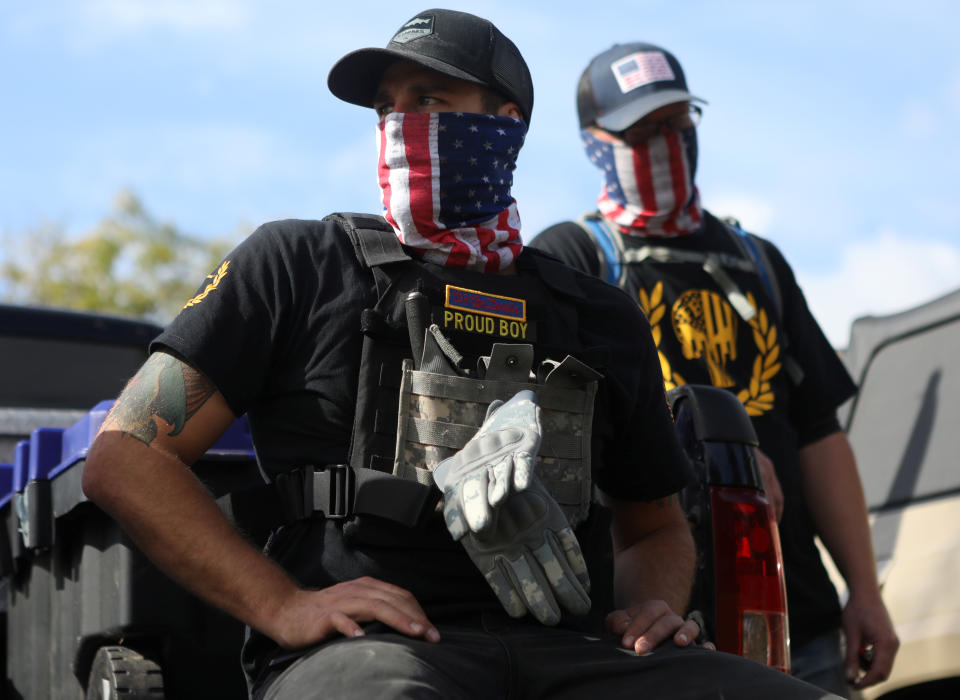Tim Scott suggests Trump 'misspoke' when refusing to condemn white supremacists at debate
The only Black Republican member of the U.S. Senate suggested President Trump “misspoke” during Tuesday's debate in Cleveland when he refused to explicitly condemn white supremacist groups.
“I think he misspoke,” Sen. Tim Scott, R-S.C., said Wednesday when asked by reporters about Trump’s comments before a meeting on Capitol Hill with Amy Coney Barrett, the president’s Supreme Court nominee. “I think he should correct it. If he doesn’t correct it, I guess he didn’t misspeak.”
During a discussion of the recent protests and violence in Portland, Ore., and other U.S. cities at Tuesday night’s debate, moderator Chris Wallace of Fox News asked Trump if he was willing to condemn white supremacists and militia groups and tell them to stand down and not contribute to the violence.
[‘Stand back and stand by’: Trump refuses to condemn white supremacists]
“Sure. What do you want to call it?” Trump asked, seeking clarification on what he was supposed to be condemning.
“White supremacists and right-wing militia,” Wallace said.
Former Vice President Joe Biden suggested that the president specifically condemn the Proud Boys, a group of self-described “Western chauvinists” whose members appeared alongside white supremacist groups at the 2017 Unite the Right rally in Charlottesville, Va., and have been a consistent presence during more recent clashes in Portland.
“Proud Boys? Stand back and stand by,” Trump said. “But I’ll tell you what, somebody’s got to do something about antifa and the left.”
The Proud Boys quickly embraced the moment on Telegram, an encrypted messaging service popular among extremist groups, posting clips of the president’s comment and even circulating an image with Trump’s quote superimposed over its logo.

The morning after the debate, Portland police arrested a member of the Proud Boys, according to Oregon Public Radio. Alan Swinney faces multiple assault charges, and has been accused of pointing a firearm at another person as well as the unlawful use of a weapon.
Sen. Kamala Harris, Biden’s running mate and one of two other Black members of the U.S. Senate, quickly seized on Trump’s remarks following the debate.
“I heard what we all heard: The president of the United States, in the year of our Lord 2020, refuses to condemn white supremacists,” Harris said on CNN, adding: “People talk about ‘Is he dog whistling?’ Dog whistling through a bullhorn.”
[Key takeaways from the most juvenile presidential debate in U.S. history]
Speaking to reporters on the South Lawn Wednesday afternoon, Trump tried to walk back his remarks.
“I don't know who Proud Boys are,” Trump said. “But whoever they are they have to stand down, let law enforcement do their work.”
The president added: “Joe Biden also has to say something about antifa. It's not a philosophy ... These are people that hit people over the head with baseball bats. He's got to come out and he's got to be strong, and he's got to condemn antifa. It's very important."
Trump has in the past sought to blame violence stemming from some recent protests on antifa, an umbrella term for radical left-wing activist groups that sometimes engage in street brawls and property destruction. He repeated that claim during the debate, saying most of the violence he’s seen is from the left.
Antifa, short for anti-fascist, includes many self-described anarchists who are willing to use violence in order to fight white supremacists, neo-Nazis and others they deem to be “fascists.” On Tuesday night, Biden said that “antifa is an idea, not an organization.”
Contrary to the narrative promoted by Trump, experts who study domestic extremism — as well as FBI Director Christopher Wray and acting Homeland Security Secretary Chad Wolf — have testified to Congress that white supremacist violence is the most persistent and deadly domestic terror threat facing the country.
Biden pointed out Wray’s comments during the debate, to which Trump said, “Well, you know what? He’s wrong.”

The president also has a history of refusing to unequivocally condemn hate groups that have supported his political rise.
Trump’s infamous response to the deadly clashes between white supremacists and counterprotesters in Charlottesville, Va., in 2017 — that there were “very fine people on both sides” — provoked widespread outrage among Democrats, Republicans and even members of his administration.
Biden invoked Trump’s Charlottesville comments in a video announcing the launch of his 2020 presidential campaign.
“That’s when we heard the words of the president of the United States that stunned the world and shocked the conscience of this nation,” Biden said. “With those words, the president of the United States assigned a moral equivalence between those spreading hate and those with the courage to stand against it. And in that moment, I knew the threat to this nation was unlike any I had ever seen in my lifetime.”
With Christopher Wilson and Caitlin Dickson.
Cover thumbnail photos: Brian Snyder/Reuters, Shawn Thew/Pool via Reuters
___
Read more from Yahoo News:
Trump tries to undermine the legitimacy of the election with baseless claims at debate
At debate, Trump talks over Biden, who fires back ‘would you shut up man?’
Trump mocks Biden for wearing masks: ‘Every time you see him, he's got a mask’
‘Bleach,’ shorthand for Trump’s confused response to COVID, comes back to haunt him
Trump admits greenhouse gases contribute to climate change ‘to an extent’
Trump says he’s paid ‘millions’ in taxes but rejects Biden’s demand to release his returns
Yahoo 360: Can American democracy survive a contested election?



